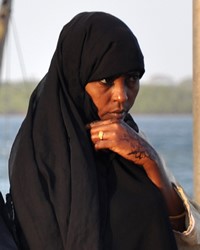Swahili in United States

Photo Source:
Luciano Rizzello - Flickr
Creative Commons
|
Send Joshua Project a map of this people group.
|
| People Name: | Swahili |
| Country: | United States |
| 10/40 Window: | No |
| Population: | 63,000 |
| World Population: | 1,196,000 |
| Primary Language: | Swahili |
| Primary Religion: | Islam |
| Christian Adherents: | 25.00 % |
| Evangelicals: | 12.00 % |
| Scripture: | Complete Bible |
| Ministry Resources: | Yes |
| Jesus Film: | Yes |
| Audio Recordings: | Yes |
| People Cluster: | Bantu, Swahili |
| Affinity Bloc: | Sub-Saharan Peoples |
| Progress Level: |
|
Introduction / History
The name Swahili literally means "coast," and is the name given to several people groups that share a common culture (Uswahili), language (Kiswahili), and religion (Islam). Thousands of years ago, groups of hunters inhabited the East African coast and intermarried with the Cushite shepherds there. By the second century, Bantu-speaking people from Northern Congo came to the area and intermarried with them. Subsequent groups of people migrating from other areas such as the Persian Gulf also joined these coastal people, adopting parts of their culture and language. Later, Indonesian, Hindi, and Portuguese traders settled on the coast. Soon, they too began adopting Swahili traits and became a part of the larger group. Since that time, groups of Swahili have migrated to different parts of the coast, forming their own dialects and cultural variations. The Swahili language has many different dialects. A number of its words were borrowed from Arabic, the second language for many Swahili. More recently, Africans have come to the U. S. seeking work, freedom, and a chance to start anew.
Where Are they Located?
Today, the Swahili are scattered along Eastern Africa and the Persian Gulf, from Saudi Arabia to Zambia. Though they are called "Swahili" by others, they prefer to be named according to their local settlements. A small number lives in the United States. Within the U. S., they are most likely to be found in NYC, Washington DC, Dallas Ft. Worth, or Atlanta.
What Are Their Lives Like?
In the United States, there is a discrepancy between the African-Americans who were brought as slaves centuries ago and more recent immigrants from Africa. The recent African immigrants, like the Swahili, are generally prosperous. They often own businesses. These new "African-Americans" are increasing in number and have been since the 2010s. African immigrants to the United States form their own cultural associations and hold cultural events in American urban centers. Since the Swahili people straddle many countries along the coast of East Africa, they do not fit in as well as Somalis or Ethiopians for example. They are most likely involved with Pan African events. If someone were going to lead them to Christ, they would probably be likely to attend churches that are culturally Pan African.
What Are Their Beliefs?
Nearly all of the Swahili profess to be Muslims; however, they have kept many of their traditional pre-Islamic beliefs and practices. For example, they believe in many spirits - both good and evil. They also believe in the supernatural power of witches and sorcerers. Those who have moved to Western cities are more likely to adhere to traditional Islam rather than African religion.
What Are Their Needs?
Although Christian resources are available in the Swahili language, there are only a small number of Swahili believers. Laborers who are sensitive to their Muslim culture are greatly needed to work among the Swahili. The United States has religious freedom, so it would be especially easy for someone to reach them there. Who will do it?
Prayer Points
Pray for His kingdom to come and His will to be done among the Muslim Swahili people in the U. S. Pray for a movement of Swahili households to study the Bible and accept the blessings of Christ. Pray for workers who are filled with the fruit and the power of the Holy Spirit to go to the Swahili people. Pray for a spiritual hunger that will drive a movement of the entire Swahili people to become His ambassadors in the United States.